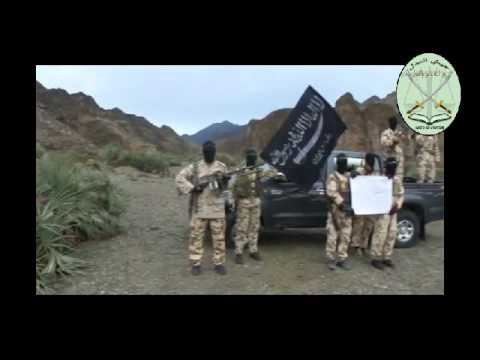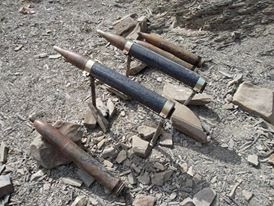Tensions on Iran’s border with Pakistan appear to be growing in the wake of fresh attacks on Iranian security forces by Sunni insurgent group Jaish ul-Adl in the predominantly Sunni province of Sistan Baluchestan.
Jaish ul-Adl on Wednesday claimed responsibility for a short-range missile attack on an Iranian police station in the Kohak area of Saravan. The group said the attack came in retaliation for shelling by the Iranian security forces on targets in the Mashkel area of Pakistan, just across the border.
According to a statement in Persian issued by Jaish ul-Adl, the group’s Sheikh Zia’i Martyr Battalion carried out the attack on a police station on December 11. The extent of damage to the station remains unknown.
Jaish ul-Adl issued a warning to the Iranian forces to end their shelling of targets across the border in Pakistan. The statement accused Iran of carrying out the attacks to “create fear among local people and deter them from supporting the Mujahideen”.
The group warned Tehran that it has short-range missiles which it can use against more Iranian security targets, and put this image on its blog:
IRAN FIRING ROCKETS INTO PAKISTAN?
Some Baloch and English-language Pakistani outlets have reported on the Iranian security forces’ firing at targets in Mashkel in the Washuk area of Pakistan, just across the border from Sistan Baluchestan. However, sources complain that the mainstream Pakistani media have mostly underreported the issue.
The Baloch Hal, an online Baloch newspaper in English, blames Iran in a report on Thursday:
For the past one month, the Iranian security forces have been excessively firing rockets from their side on the bordering towns of Panjgur and Mashkil located in Pakistani Balochistan. The unprovoked cycle of rocket attacks has caused significant outrage as well as fear among the local population.
While one rocket attack on November 25 killed a three-year old Baloch girl and injured her parents and two siblings in Kech district, another citizen, Nasir Ahmed, a resident of Paroom area in Panjgur district, was shot dead by the Iranian authorities on December 10th. Mr. Ahmed’s killing took place only a day after the Iranian security forces fired nine rockets on Mashkil town of Washuk district while they shot another four rockets on Panjgur district. Local residents say the the attacks killed several goats and cows which are the primary source of livelihood for the poor Baloch families in the border areas.
The death of the three-year-old girl was reported also by the Pakistani outlet Express Tribune on November 26. That report said that three rockets from Iran hit three houses in Kech on November 25, and cited a local man as saying:
“There were three huge explosions heard as far as 25 kilometres away in Tump, on the outskirts of Turbat,” a local officer of Balochistan Levies told The Express Tribune.
“The houses were destroyed. These residences allegedly belonged to Mullah Umar, a member of Jundallah – a banned militant group, and his relatives,” he said.
However, some local security forces in the Baloch region in Pakistan denied that the rockets were fired from Iran, as the Express Tribune notes:
Balochistan Home Secretary Akbar Durrani said these were rocket attacks, launched by unknown people from an undisclosed location in Kech district. He ruled out the possibility of the attack being carried out by Iranian border guards.
Meanwhile, other Pakistani security officials have blamed Iran for the attacks — albeit anonymously. Dawn reports:
An official of the provincial home and tribal affairs department who requested anonymity told Dawn.com that the rockets fired by Iranian forces landed at the Paroum area of Panjgoor.
“The loud noise from the rockets were heard far and wide and caused panic in the area,” he said.
CNBC Pakistan notes that the Chief Minister of Balochistan, Dr. Abdul Malik, condemned the “rocket attack by Iran”.
IRAN THREATENS TO ATTACK INSURGENTS IF PAKISTAN WILL NOT
While Islamabad has not made any statement about the alleged rocket attacks from Iran, National Security and Foreign Policy Parliamentary Commission (NSFP) Spokesman MP Hossein Naghavi Hosseini warned this month that if Pakistan “failed to act according to international law regarding terrorist groups operating on its soil”, then Iran would enter Pakistani territory to suppress the insurgents, and that Tehran was in talks with Pakistan on the issue.
It is likely, therefore, that the rocket attacks took place with Islamabad’s consent, if not cooperation.
BLAMING THE SAUDIS
The increasing number of attacks against Iranian security forces in Sistan Baluchestan have not gone unnoticed in the Iranian media, even though in the past Iran’s State media have not reported attacks in the province in line with Tehran’s narrative that it had stamped out the Sunni insurgent movement in 2010, after it hanged the leader of Jundullah, Abdolmalek Rigi.
While some of Iran’s media are mentioning the attacks, there is no discussion of the Sunni insurgency as a domestic movement based on local concerns. Instead, Iranian hardline outlets — notably Mashregh — have accused external actors of “provocation”, particularly Qatar and Saudi Arabia.
A recent editorial in Mashregh claims that Saudi Arabia’s intelligence services have allocated $500 million to support Sunni insurgencies in Sistan Baluchestan, with the aim of disrupting the province and the Islamic Republic.


